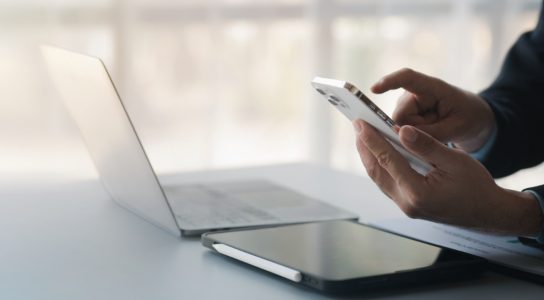Mobile phones carry hidden threats in Australia's biosecurity
By
Gian T
- Replies 22
In the land down under, we pride ourselves on our pristine natural environment and robust agricultural sector, which is why Australia's biosecurity measures are among the strictest in the world.
But there's a hidden threat that could be slipping through the cracks, and it's something most of us carry around every day: our mobile phones.
We understand the importance of staying connected with loved ones and keeping up with the times, which often means having a mobile phone handy.
However, a recent study has raised alarms about the potential biosecurity risks these devices could carry into the country.
Images of muddy boots or exotic fruits might come to mind when considering biosecurity risks, but not our trusty smartphones.
However, groundbreaking research by Dr Lotti Tajouri and his team at Bond University has revealed that our phones could be a trove of microbial threats.
The study involved swabbing the mobile phones of 20 international conference attendees in Sydney, whose owners came from various parts of the globe.
The DNA analysis of these swabs in the laboratory uncovered a staggering 2204 microbes, including bacteria, viruses, fungi, and protists.
Among these were antibiotic-resistant bacteria like Staphylococcus aureus, notorious for causing hospital infections.
The implications of this are significant, considering antibiotic resistance is a growing global health crisis, with nearly 5 million deaths associated with it in 2019 alone.
The UN projects this could escalate to 10 million deaths by 2050.
But it's not just human health at risk. Some of the detected pathogens threaten Australia's unique flora and fauna.
For instance, Pantoea stewartii, found on a traveller's phone, can devastate crops and cause septicaemia in rare native parrots.
Another fungus detected, Fusarium solani, is similar to one associated with a pest wreaking havoc in Western Australia's forests and agricultural areas.
Considering the volume of international arrivals, the study estimated that in 2022 alone, mobile phones could have introduced over 749 million microbes into Australia.
This is a sobering thought, especially considering our phones are rarely scrutinised at borders.
Our phones are a part of our daily lives, with the average user touching their device over 2600 times daily.
They accompany us everywhere—even to the bathroom, as the research points out, where they can pick up faecal-derived E. coli.
Nearly half of the mobile phones tested during the pandemic were contaminated with the SARS-CoV-2 virus.
Dr Tajouri recommended using UV-C light to decontaminate phones, which can kill germs by damaging their DNA.
For those without access to UV-C sanitisers, Apple suggested using a 70 per cent isopropyl alcohol wipe or disinfecting wipes.
Still, it advises against using bleach, hydrogen peroxide, or submerging the phone in any cleaning agents.
Dr Tajouri cleans his phone at least five times a day, and while that may seem excessive, it's a small price to pay to keep our country safe from biological threats.
 Have you ever considered your phone as a potential hazard in this way? Will you change your habits after learning about this research? Let us know in the comments below.
Have you ever considered your phone as a potential hazard in this way? Will you change your habits after learning about this research? Let us know in the comments below.
But there's a hidden threat that could be slipping through the cracks, and it's something most of us carry around every day: our mobile phones.
We understand the importance of staying connected with loved ones and keeping up with the times, which often means having a mobile phone handy.
However, a recent study has raised alarms about the potential biosecurity risks these devices could carry into the country.
Images of muddy boots or exotic fruits might come to mind when considering biosecurity risks, but not our trusty smartphones.
However, groundbreaking research by Dr Lotti Tajouri and his team at Bond University has revealed that our phones could be a trove of microbial threats.
The study involved swabbing the mobile phones of 20 international conference attendees in Sydney, whose owners came from various parts of the globe.
The DNA analysis of these swabs in the laboratory uncovered a staggering 2204 microbes, including bacteria, viruses, fungi, and protists.
Among these were antibiotic-resistant bacteria like Staphylococcus aureus, notorious for causing hospital infections.
The implications of this are significant, considering antibiotic resistance is a growing global health crisis, with nearly 5 million deaths associated with it in 2019 alone.
The UN projects this could escalate to 10 million deaths by 2050.
But it's not just human health at risk. Some of the detected pathogens threaten Australia's unique flora and fauna.
For instance, Pantoea stewartii, found on a traveller's phone, can devastate crops and cause septicaemia in rare native parrots.
Another fungus detected, Fusarium solani, is similar to one associated with a pest wreaking havoc in Western Australia's forests and agricultural areas.
Considering the volume of international arrivals, the study estimated that in 2022 alone, mobile phones could have introduced over 749 million microbes into Australia.
This is a sobering thought, especially considering our phones are rarely scrutinised at borders.
Our phones are a part of our daily lives, with the average user touching their device over 2600 times daily.
They accompany us everywhere—even to the bathroom, as the research points out, where they can pick up faecal-derived E. coli.
Nearly half of the mobile phones tested during the pandemic were contaminated with the SARS-CoV-2 virus.
Dr Tajouri recommended using UV-C light to decontaminate phones, which can kill germs by damaging their DNA.
For those without access to UV-C sanitisers, Apple suggested using a 70 per cent isopropyl alcohol wipe or disinfecting wipes.
Still, it advises against using bleach, hydrogen peroxide, or submerging the phone in any cleaning agents.
Dr Tajouri cleans his phone at least five times a day, and while that may seem excessive, it's a small price to pay to keep our country safe from biological threats.
Key Takeaways
- A study by Bond University found that mobile phones could potentially carry biosecurity risks to Australia due to the microbes they harbour.
- The research detected pathogens from international travellers, including antibiotic-resistant bacteria, on mobile phones.
- The study emphasises the need for biosecurity measures to include decontamination of mobile phones for incoming international travellers to Australia.
- Practical advice for the public includes using UV-C lights or recommended wipes to sanitise phones regularly and avoiding using phones in the bathroom or while eating.






